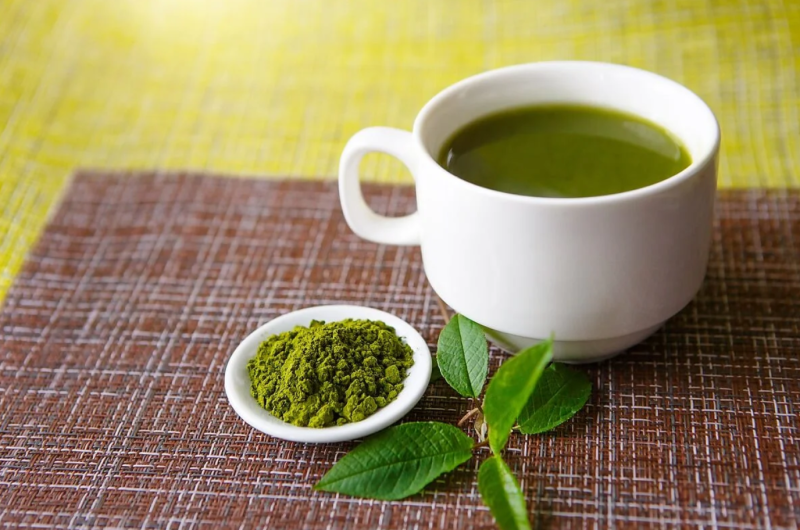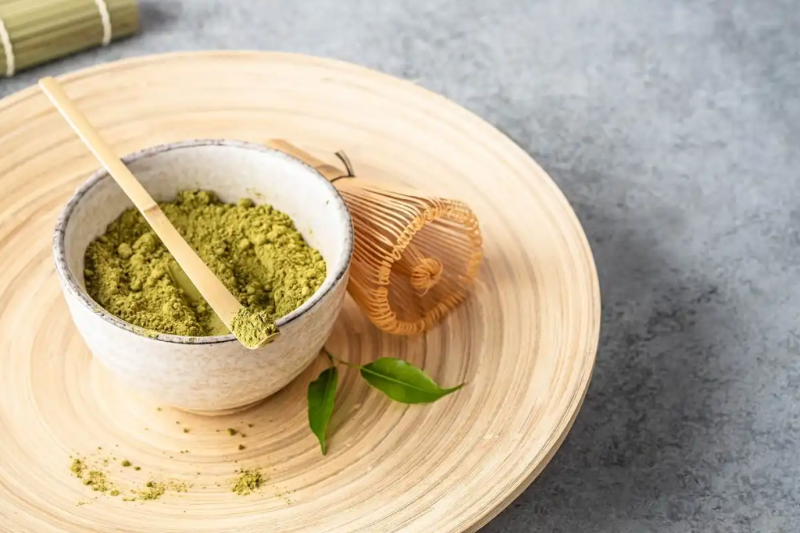
Green tea has been used for centuries in many Asian countries. Today it is —along with coffee— one of the most consumed beverages in the world. Some choose it for its flavor, and others for its properties. In any case, it is worth knowing that there are also contraindications to the consumption of green tea.
Therefore, avoiding or moderating its consumption is advisable since its excessive use could have adverse effects. Do you want to know more about it? Next, we will tell you in which cases it is better to avoid its intake and how to consume it safely.
Contents
Green tea: an ancient and beneficial drink
In many Western countries, green tea can be considered a novelty drink. However, in the East, its use and cultivation date back centuries. The major producing countries are China and India, followed by Sri Lanka, Kenya, and Indonesia.
Green tea (black or oolong ) comes from the Camellia sinensis plant. It is a non-fermented tea, so it keeps some of its active ingredients intact. Its leaves are collected fresh and then rolled and dried.
In China, it has always been considered a medicinal infusion. In particular, it stands out for its content of vitamins, minerals, caffeine, polyphenols, and catechins with antioxidant capacity.
Studies in humans suggest that it can help reduce the risk of some diseases, such as cardiovascular diseases and some types of cancer. It promotes oral health, is neuroprotective, and helps increase bone mineral density.
This places it within the group of functional foods and beverages. The research is promising, but more evidence is needed to understand its contributions to health and, thus, formulate advice on its consumption.
In addition, as we have mentioned, its consumption is not always adequate, and in excess, it could have some harmful effects. Which is it? In the following space, we detail them.
Main contraindications of green tea

Iron deficiency anemia
As with coffee, green tea interferes with the absorption of iron. This happens in the case of non-heme iron (which comes from vegetables) and heme (which comes from animal sources).
For this reason, its excessive intake could cause iron deficiency anemia due to absorption problems. In this sense, avoiding it or consuming it away from meals is advisable if you have anemia or a tendency to suffer from it.Sleeping problems
Caffeinated beverages are not the most suitable for those who have difficulty sleeping. This is stated by experts from the Sleep Foundation, based on data from scientific studies.
Adenosine is a chemical produced in the brain that promotes sleep. Caffeine can block it, and when this happens, people stay alert for longer.
Likewise, caffeine has been found to interfere with the circadian rhythms of melatonin. Therefore, sleep onset is delayed if tea infusions or other caffeinated beverages are consumed close to bedtime.
anxiety symptoms
Aside from insomnia problems, excessive caffeine intake is also linked to anxiety and the nervous system. Furthermore, the American Psychiatric Association notes the existence of four caffeine-related disorders:
- Caffeine poisoning.
- Caffeine withdrawal.
- Some non-specific disorders.
- Caffeine-induced problems, such as anxiety and sleep disorder.
When the amounts of caffeine are very high, the effects due to the blockade of adenosine are multiplied. And then anxiety symptoms can appear. People with panic or social anxiety disorder may be susceptible.
The main warning signs include the following:
- Nervousness.
- Concern.
- DDifficultyare sleeping.
- Gastrointestinal disorders.
- Incrise of cardiac frecuency.
Adverse effects on the liver
One of the most abundant active ingredients in tea is catechins. Among them, epigallocatechin-3-gallate (EGCG) stands out, whose excessive intake has been related to possible liver damage.
Indeed, as a special panel of the European Food Safety Authority (EFSA) concludes, there is scientific evidence of these. To be more exact, an increase in transaminases is observed in some people after ingesting doses greater than 800 milligrams of EGCG.
However, it should be noted that this same group of experts considers that taking infusions prepared traditionally and reconstituted drinks are safe since they provide lower levels of catechins.
Other contraindications of green tea
Contraindications for green tea consumption often refer to large doses or misuse of supplements. In general, ingesting herbal teas is considered safe for most healthy adults. However, there are some groups of people in which its use is discouraged.
People with caffeine sensitivity
Susceptibility to this component may vary from person to person. For those who are caffeinated to a high degree, it is best to avoid green tea and other caffeinated beverages.
Taking medication
The active principles of green tea can interact with some drugs or other supplements. Some examples are ephedrine or theophylline. So in the case of following a medication regimen, it is preferable to consult the doctor to avoid possible damage.
Pregnancy and lactation
The American Food and Drug Administration considers it safe to drink less than 6 cups of green tea per day for pregnant women. However, this same organization cites studies that show that pregnant women who consume it have lower blood folate levels.
Folic acid is considered a critical nutrient for its ability to reduce the risk of neural tube defects. For this reason, it may be prudent to avoid green tea during pregnancy. In addition, during lactation, it is advisable to consult with the doctor to ensure adequate consumption.
Children and adolescents
The American Academy of Child and Adolescent Psychiatry points out that no caffeine dose is considered safe for minors. Pediatricians generally advise against its use in children under 12 years of age. They also propose limiting the maximum amount to 100 milligrams a day for youth ages 12 to 18.
How to make a safe consumption and without contraindications of green tea
Consuming beverages such as green tea or coffee is considered safe for most of the population. Even within the framework of a healthy diet, they can provide some health benefits.
The American Food and Drug Administration (FDA) sets the safe limit at 400 milligrams of caffeine daily. This means that in healthy people, it does not pose a health risk, nor does it suggest the appearance of side effects such as nerves, sleep disturbances, or nausea.
A cup of green or black tea (about 225 milliliters) contains between 30 and 50 milligrams of caffeine. Most people can drink between 2 and 4 cups a day without experiencing problems. However, for other people, this threshold might be lower.
For this reason, in the event of any symptoms after taking it, it is best to reduce the amount or stop consumption. In addition, those who start taking it should start with low doses. If there are more doubts regarding its adequate intake, it is preferable to consult with the doctor.